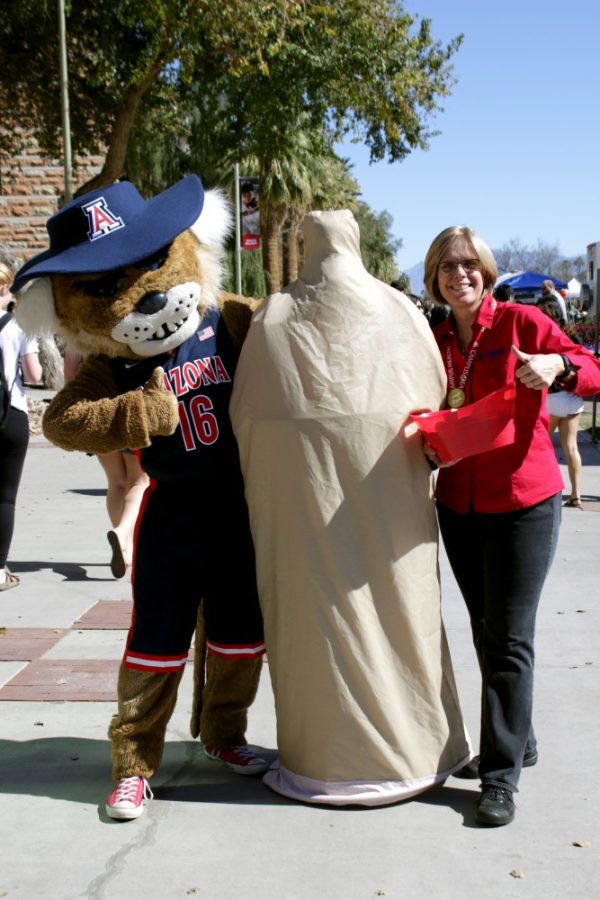Valentine’s Day is just around the corner, so it’s time for all the UA lovebirds to grab some roses, buy some chocolates and, most importantly, get some condoms.
While Feb. 14 is a special day, it’s important that contraception makes an appearance on more days than just this one. But you’re in luck: being a UA student guarantees that contraception and other sexual health resources are available to you every day of the year.
In order to accurately service the sexual health needs of UA students, the Health Promotion and Preventative Services at UA Campus Health Service administers an annual health and wellness survey to gauge the activities of students and their corresponding needs. The 2015 survey was administered to 2,705 randomly selected students and some interesting trends were discovered.
It was found that, out of the most common sexual behaviors, oral sex leads the way, followed by vaginal and anal intercourse, respectively.
Specifically, 73.8 percent of students in the survey have engaged in oral sex, while 69.9 percent of students have engaged in vaginal sex and only 22.6 percent in anal intercourse.
While this may seem surprising, this trend is actually the norm among other populations.
Oral sex is the leader of the sexual behaviors, perhaps due to its dissociation from sex. While it is technically considered a form of sex, many people may view it as an alternate way to find pleasure without the commitment of sexual intercourse.
Although all sexual actions are a serious matter, the consensus of students tend to view oral sex as something less involved than vaginal or anal intercourse and with less implications, such as that of virginity.
Though vaginal intercourse held a percentage close to that of the oral intercourse, it is easy to see that anal intercourse holds a much smaller percentage, as some students are less eager to explore more unfamiliar varieties of intercourse.
Among these sexually active students, the survey reports that 28.7 percent of UA students have never had vaginal or anal intercourse. Likewise, 35.6 percent of sexually active students have had zero sexual partners, 16.9 percent have had three sexual partners and only 8.5 percent have had six sexual partners during the last school year.
While it is important to know these trends in order to make appropriate resources available at Campus Health, the survey questions regarding actual sexual health provide the most insight. It is reported that 67.6 percent of students usually or always use a condom, 38.3 percent have been tested for sexually transmitted infections within the last year and 61.7 percent have not been tested. This specific data has helped Campus Health tailor its services and resources to optimize the sexual health of students.
In order to further boost contraception use, as well as STI testing, Campus Health and the Health Promotion and Preventative Services offer some unique and innovative options.
The UA provides a platform for students to confidentially ask sex and sexual health related questions in the Daily Wildcat.
In the SexTalk Column, which appears in Monday issues, health educators from Campus Health answer student’s burning sex and relationship questions. Through this, Campus Health promotes the idea that an educated understanding of emotion, sex and healthy relationships is critical to both physical and psychological sexual well being
To support this idea, Trojan condoms releases its annual Sexual Health Report Card, which ranks the availability and quality of sexual health resources on American college campuses. In 2015, the UA placed 10th in the nation, after being ranked fourth in 2014 and third in 2013.
“The fact that UA, a public institution, consistently ranks in the top 10, rivaling the amazing and well-funded resources provided by private universities, says a lot about the quality of our sexual health resources,” said David Salafsky, the director of Health Promotion and Preventive Services for Campus Health.
Trojan specifically looked at categories that span a variety of sexual services, including quality of information and resources on the campus website, contraceptive availability, STI testing, outreach programs, sexual assault programs, hours of operation and drop-in availability in the campus’ clinic.
Campus Health holds an annual SexTalk week around Valentine’s Day. Events include LGBTQA support groups, SexTalk Resource Fair, Queer Sex Ed, the Consent Workshop and Free Condom Friday. Ultimately, it is resources and events like this that make the UA go above and beyond in sexual health and corresponding services.
Follow Lena Naser on Twitter.









